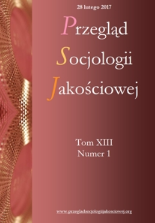Podłużne badanie jakościowe doświadczenia wolontariuszy sprawujących opiekę nad pacjentami w ramach programu profilaktyki powikłań hospitalizacji osób starszych na oddziale chorób wewnętrznych - Projekt Zdrowy Kontakt
Longitudinal Qualitative Study on the Experience of Volunteers Giving Care to Older Patients as Part of the Preventive Intervention on Internal Hospital Ward - Wholesome Contact Project
Author(s): Weronika Kałwak, Anna Bańbura, Oliwia Głowacz, Klaudia Kawa, Paulina Knutelska, Małgorzata Opoczyńska-Morasiewicz, Stanisław Górski, Michał NowakowskiSubject(s): Psychology, Sociology, Health and medicine and law
Published by: Uniwersytet Łódzki - Wydział Ekonomiczno-Socjologiczny
Keywords: volunteering; care-giving; geriatric patients; qualitative study; Wholesome Contact;
Summary/Abstract: A longitudinal qualitative study on the experience of volunteers giving care to patients of internal geriatric ward was conducted under the Wholesome Contact Project - the first program for non-pharmacological prevention of delirium among hospitalized elders in Poland and Central-Eastern Europe. The volunteers were recruited from psychology, nursing, and medical students and then asked to visit patients in hospital ward to provide complex intervention. Idiographic approach was adopted in the study that consists of a series of interpretative case studies. Eight participants were interviewed twice in a semi-structured manner—before starting and after completing the period of volunteering. The aim of repeated interviews was to describe the changes in experience, motives, beliefs, and self-understanding of students influenced by their work on geriatric ward. In the study, Interpretative Phenomenological Approach was chosen to analyze the data, with the support of Atlas.ti software. As a result, we obtained complex descriptions of individual subjective experience of the participants’ work at a hospital ward, and several common issues revealed. The major ones are connected to the inevitability of contact with thoughts about death and to attempting to connect with patients suffering dementia, after the stroke, or presenting cognitive and perceptual disorders of delirium. Another substantial difficulty is the lack of visible effects of undertaken actions, decreasing the volunteers’ motivation to visit the ward and to participate in the project. The most important theme that came out from the analysis is the relationship between private and professional spheres in giving care to patients. Descriptions obtained and the attempts to understand the experience of medical and psychology students working as volunteers at geriatric ward may serve as a starting point to reflection on the medical personnel’s perspective and possible ways of supporting and protecting them from extensive burden of care, stress, and professional burnout. They might also be an inspiration for the future medical staff education.
Journal: Przegląd Socjologii Jakościowej
- Issue Year: XIII/2017
- Issue No: 1
- Page Range: 32-67
- Page Count: 36
- Language: Polish

